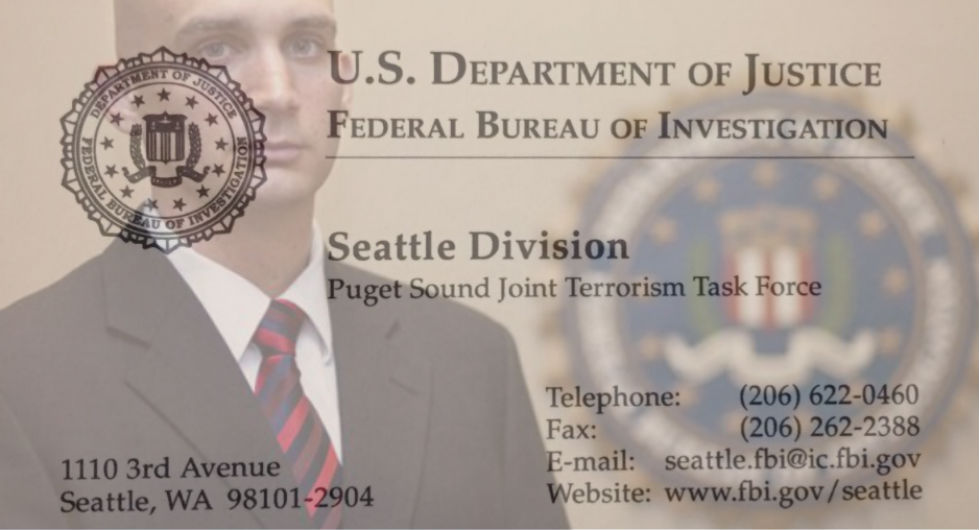Submitted Anonymously
This morning, Friday April 27th, FBI agents visited at least three houses in Seattle and left business cards with the names of individuals they wanted to talk to written on the back. At one house the agents picked packages up on the porch and pretended to be delivery people in order to confirm the identities of those living there. When it became clear they were not delivery people the door was quickly slammed in their faces.
These visits have become a yearly ritual. In the week before May Day, the feds do the rounds to make sure that everyone knows they are watching. We should see this for what it is – an intimidation tactic and part of a strategy of repression designed to scare people out of organizing. It is important to take visits like this seriously, but their predictability also makes it fairly clear that they are mostly intended to make people feel afraid.
We are sharing this information here because we believe that communicating about repression is essential to keeping each other safe and to ensuring that it does not achieve it’s desired end – leaving communities feeling isolated and afraid. A similar report written last year in the days leading up to the 1st provided some helpful advice:
“Remember that the FBI already knows that they have talked to you – telling your comrades about what happened is the safest thing to do. Also know that often when the FBI flex and try to intimidate someone, it’s not necessarily because they have dirt on you; they are hoping to scare you into admitting something they don’t yet know. Don’t let the Feds or any other pigs intimidate you out of fighting back. Make good decisions, read up on security culture (read here or listen here ) and tech security precautions (here and here ) Remember that the communities that are safest from repression are the ones in which people communicate, support and treat each other well. Don’t talk to the police ever!”
Here are more resources for resisting repression:
A note from the PSA editors: feel free to submit updates to this article or other experiences with state harassment here


Submitted Anonymously
This morning, Friday April 27th, FBI agents visited at least three houses in Seattle and left business cards with the names of individuals they wanted to talk to written on the back. At one house the agents picked packages up on the porch and pretended to be delivery people in order to confirm the identities of those living there. When it became clear they were not delivery people the door was quickly slammed in their faces.
These visits have become a yearly ritual. In the week before May Day, the feds do the rounds to make sure that everyone knows they are watching. We should see this for what it is – an intimidation tactic and part of a strategy of repression designed to scare people out of organizing. It is important to take visits like this seriously, but their predictability also makes it fairly clear that they are mostly intended to make people feel afraid.
We are sharing this information here because we believe that communicating about repression is essential to keeping each other safe and to ensuring that it does not achieve it’s desired end – leaving communities feeling isolated and afraid. A similar report written last year in the days leading up to the 1st provided some helpful advice:
“Remember that the FBI already knows that they have talked to you – telling your comrades about what happened is the safest thing to do. Also know that often when the FBI flex and try to intimidate someone, it’s not necessarily because they have dirt on you; they are hoping to scare you into admitting something they don’t yet know. Don’t let the Feds or any other pigs intimidate you out of fighting back. Make good decisions, read up on security culture (read here or listen here ) and tech security precautions (here and here ) Remember that the communities that are safest from repression are the ones in which people communicate, support and treat each other well. Don’t talk to the police ever!”
Here are more resources for resisting repression:
A note from the PSA editors: feel free to submit updates to this article or other experiences with state harassment here